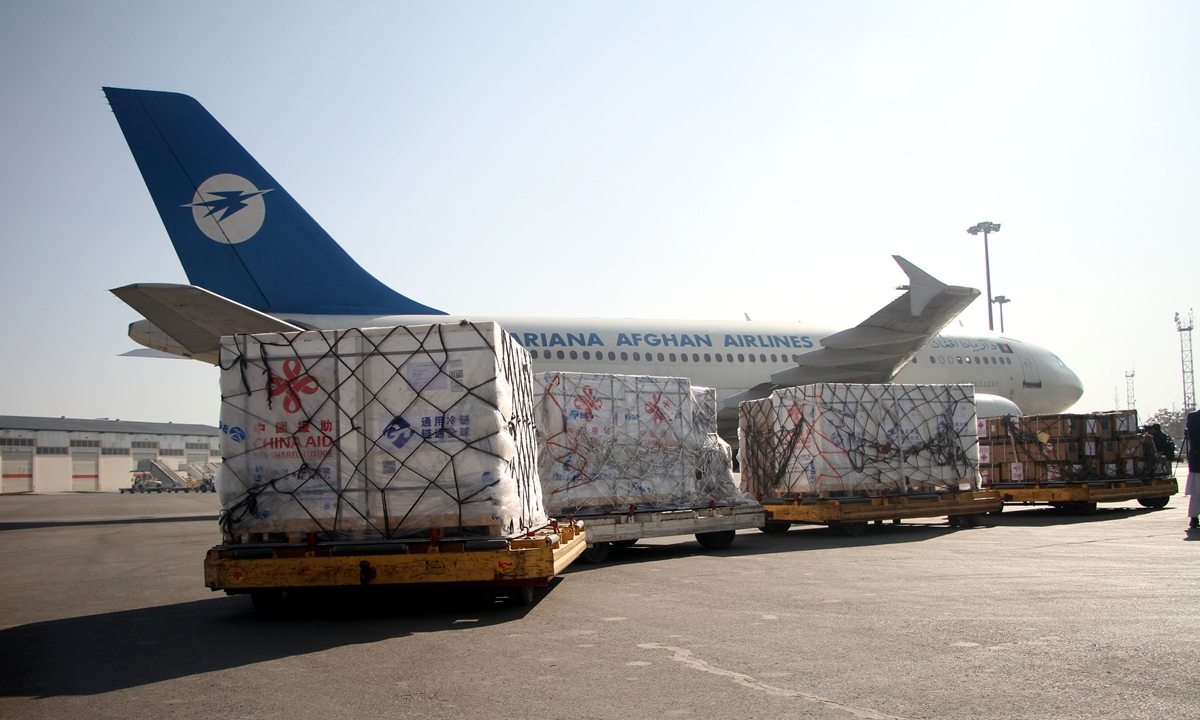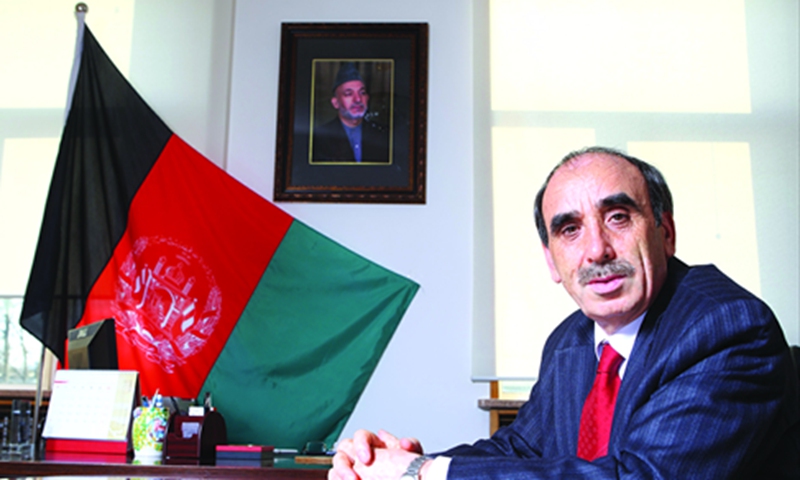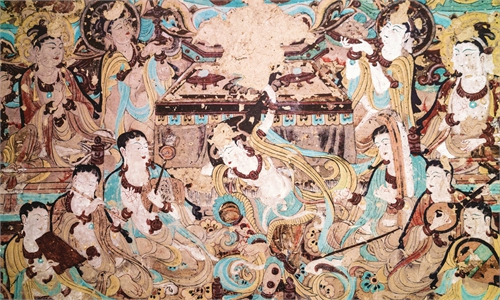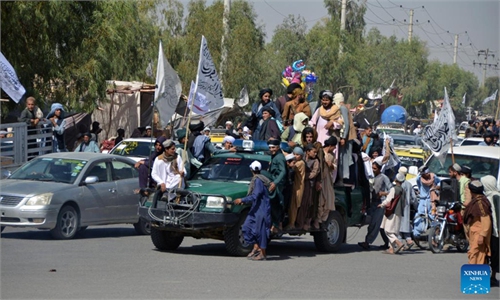China taking own development path is a key lesson for its neighbors: former Afghan ambassador

The first batch of Chinese-aided COVID-19 vaccines arrives in Kabul, capital of Afghanistan on December 9, 2021. Photo: Xinhua
Editor's Note:For Chinese people, the past decade has been epic and inspirational. The country, under the leadership of the Communist Party of China (CPC) Central Committee with Comrade Xi Jinping at the core, has made great endeavors in boosting its economy, deepening reforms, improving the rights of its people and acting as a responsible global power.
Sultan Ahmad Baheen (Baheen), former Afghan ambassador to China, shared with Global Times (GT) reporter Wang Wenwen which aspects of China's development and achievements in the past 10 years have impressed him the most and how China's path of modernization enlightens neighboring countries including Afghanistan.
This is the 24th article of the Global Times series about this special decade.
GT: You served as Afghanistan's ambassador to China and have gained deep understanding of China. Which aspects of China's development and achievements in the past 10 years have impressed you the most? How do you view the role of the Communist Party of China in China's development?
Baheen: I think the most important achievements of the past 10 years, three among hundreds, are:
First, serving the people as a priority. Ten years ago, the Chinese government acknowledged the fact that 300 million Chinese were living under the poverty line. The Western media suggested the figure to be as high as 700 million.
In the next 8 years, on the eve of the centennial of the establishment of the Communist Party of China, extreme poverty was eliminated and the minimum living standard above the international poverty line has been met. And it was impossible without the leadership of the CPC and the hard working of the Chinese people across the country.
Second is the Belt and Road Initiative. With this initiative, China, again, became the center of the world. If in the past, a country's name is based on the level of geographical distance from China, now, with the extension of hundreds of new connections by air, land, rail and maritime, countries of all continents can be connected, placing China again at the starting point of trade, cultural exchange and economic prosperity.
Last but not least, China became the member of outer space club by furthering its space program and utilizing it for the peace and the further development of humanity. In doing so, China made the unprecedented achievement of landing a spacecraft on the dark side of the moon.
GT: How do you understand China's diplomatic philosophy of cooperation and win-win?
Baheen: History has proven that no dispute is solved by war and fighting. The principles of peaceful coexistence, noninterference and respect to other nations' sovereignty and territorial integrity are basic principles that should prevail in relations among states. The diplomacy of China from the onset has been based on those issues. Adherent to that diplomacy makes China the most respected and trusty nation. We are living in a globalized society which is like being in a village. In the village everyone needs everyone to work together. The cooperation among nations could be based either on win-win, or on taking a lion's share. The Chinese principle of win-win brings prosperity for both sides. But those wanting to take a lion's share have no future.

Sultan Ahmad Baheen Photo: Courtesy of Baheen
GT: Afghanistan suffered from the West-initiated war. The Russia-Ukraine crisis is also facing the danger of escalation. The global security seems to be in jeopardy that requires peaceful solutions from all stakeholders. What do you think of the Global Security Initiative that China has proposed?Baheen: As the disintegration of the Soviet Union and regime changes in Eastern Europe brought to an end to the bipolar world system which was called the end of history by some Western scholars, the US became the ruler of the world and acted by her narrow interests which undermined the world order. Since then, the US and its allies have been busy writing a new order to impose on others, undermining international law, for example in the invasion of Iraq without the authority of the UN, or the invasion of Afghanistan under the guise of anti-terrorism.
With new powers emerging, like China and Russia, the unipolar world is set to be terminated. With these world changes now, people in the so-called third world are raising their voices that should be heard. It means there should be a new world order too.
Under these circumstances, the China-proposed "community of a share future for mankind" and the world order of justice will be a cornerstone for a world of peace and harmony for all and everyone, a world equal for all nations.
GT: The US not only brought to Afghanistan 20 years of pain of war, but also still keeps $7 billion in frozen funds from Afghanistan. What do Afghan people have to do to take back the money?
Baheen: The $7 billion of Afghan reserves in the US is the backup of the Afghan national currency. The values of national currency are based on two factors: the volume of national economic production and its GDP; reservation of currency (US dollar) or the reserve gold deposits. Developing countries often put their reserves in a credible bank, usually in the US. According to international law and US commitments, only the legitimate government of a nation has the right to use this reserve in an emergency situation, and the US has no authority over that reserve to utilize it under any circumstances. Allocation of Afghan reserves to any purpose by the US government is illegal and against the international commitments of the United States.
GT: Instead of consuming all Afghan resources like the US did, China has offered emergency aid to Afghanistan and maintained communication with the Taliban. How do you see the two different approaches by China and the US in developing ties with post-withdrawal Afghanistan?
Baheen: The model of aid assistance by the US and that of China are completely different. During my tenure in Beijing as the ambassador, and as well in the Afghan foreign ministry, dealing with Afghan-China relations, I witnessed how Chinese aid went directly to the targeted goals, to the needy Afghan people.
However, US humanitarian assistance is always channelized through nongovernmental agencies. An international agency's priority is always given to American ones who have contracts with the US government. This agency then subcontracts a regional one, and then next a local one. Every agency takes its share of administrative costs and the remaining funds, one-third at most, are given selectively to the targeted population. The same rule is also applied for reconstruction projects too. One of the main causes of corruption is the contracting and subcontracting by Western-style humanitarian and aid assistance in countries who receive Western support.
GT: Under the leadership of the CPC, China has successfully embarked on a path of modernization. In your opinion, what are the enlightenments of China's path? What lessons does this have for neighboring countries, including Afghanistan?
Baheen: China has a saying, "The shoes regardless of how high quality and price, if not fit your foot, would not be suitable." I think the best lesson from China's experience to follow is first build your country with the taste of your own people and then look around you. China with the thought of "security, development and reform" consequently built new China in only 30 years and became the world's second-largest economy and in many areas, the largest. I remember in one of the meetings with a minister of Afghanistan visiting China, with his counterpart, he was hinted that a country could be developed by strong leadership and strategic planning according to the need of the country and hard-working and not by foreign aid. We always hear that every nation should follow a path of development according to its own history, culture and the wishes of people. It's the key lesson we must learn from China.



